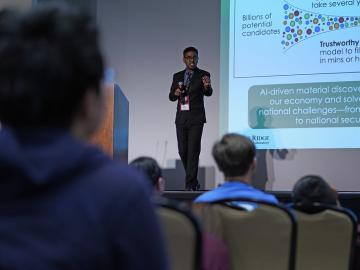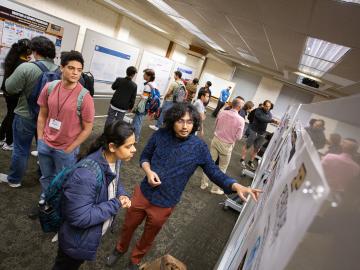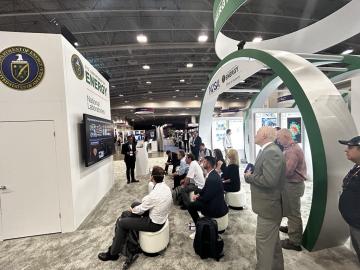
Filter News
Area of Research
- Advanced Manufacturing (1)
- Biology and Environment (16)
- Computational Biology (1)
- Computational Engineering (1)
- Computer Science (6)
- Energy Science (23)
- Fusion and Fission (2)
- Isotopes (3)
- Materials (36)
- Materials for Computing (11)
- National Security (15)
- Neutron Science (15)
- Nuclear Science and Technology (3)
- Quantum information Science (7)
- Supercomputing (47)
News Type
News Topics
- (-) Artificial Intelligence (92)
- (-) Machine Learning (51)
- (-) Microscopy (34)
- (-) Nanotechnology (29)
- (-) Polymers (18)
- (-) Quantum Science (58)
- (-) Security (17)
- (-) Space Exploration (23)
- 3-D Printing/Advanced Manufacturing (89)
- Advanced Reactors (25)
- Big Data (62)
- Bioenergy (84)
- Biology (100)
- Biomedical (53)
- Biotechnology (28)
- Buildings (50)
- Chemical Sciences (48)
- Clean Water (30)
- Composites (21)
- Computer Science (153)
- Coronavirus (30)
- Critical Materials (17)
- Cybersecurity (17)
- Education (2)
- Emergency (4)
- Energy Storage (64)
- Environment (164)
- Exascale Computing (52)
- Fossil Energy (7)
- Frontier (45)
- Fusion (47)
- Grid (54)
- High-Performance Computing (93)
- Hydropower (12)
- Irradiation (2)
- Isotopes (38)
- ITER (7)
- Materials (87)
- Materials Science (89)
- Mathematics (11)
- Mercury (10)
- Microelectronics (3)
- Molten Salt (7)
- National Security (63)
- Neutron Science (109)
- Nuclear Energy (85)
- Partnerships (37)
- Physics (38)
- Quantum Computing (39)
- Simulation (51)
- Software (1)
- Statistics (3)
- Summit (48)
- Transportation (66)
Media Contacts

At ORNL, a group of scientists used neutron scattering techniques to investigate a relatively new functional material called a Weyl semimetal. These Weyl fermions move very quickly in a material and can carry electrical charge at room temperature. Scientists think that Weyl semimetals, if used in future electronics, could allow electricity to flow more efficiently and enable more energy-efficient computers and other electronic devices.

Two ORNL teams recently completed Cohort 18 of Energy I-Corps, an immersive two-month training program where the scientists define their technology’s value propositions, conduct stakeholder discovery interviews and develop viable market pathways.

Researchers at the Department of Energy’s Oak Ridge National Laboratory and partner institutions have launched a project to develop an innovative suite of tools that will employ machine learning algorithms for more effective cybersecurity analysis of the U.S. power grid.

Oak Ridge National Laboratory scientists have developed a method leveraging artificial intelligence to accelerate the identification of environmentally friendly solvents for industrial carbon capture, biomass processing, rechargeable batteries and other applications.

Researchers used quantum simulations to obtain new insights into the nature of neutrinos — the mysterious subatomic particles that abound throughout the universe — and their role in the deaths of massive stars.
Close on the heels of its fourth summer school, the Quantum Science Center, or QSC, hosted its second in-person all-hands meeting in early May. More than 150 scientists, engineers and support staff traveled from 17 institutions to review the QSC’s progress, examine existing priorities and brainstorm new short- and long-term research endeavors.

Researchers at ORNL and the University of Maine have designed and 3D-printed a single-piece, recyclable natural-material floor panel tested to be strong enough to replace construction materials like steel.

Prasanna Balaprakash, a national leader in artificial intelligence, or AI, spoke to some of the highest achieving students in the country at the National Science Bowl in Washington D.C.

Purdue University hosted more than 100 attendees at the fourth annual Quantum Science Center summer school. Students and early-career members of the QSC —headquartered at ORNL — participated in lectures, hands-on workshops, poster sessions and panel discussions alongside colleagues from other DOE National Quantum Information Science Research Centers.

ORNL researchers and communications specialists took part in the inaugural AI Expo for National Competitiveness in Washington D.C, May 7 and 8, to showcase and provide insight into how the lab is leading the way for utilizing the vast possibilities of AI.


